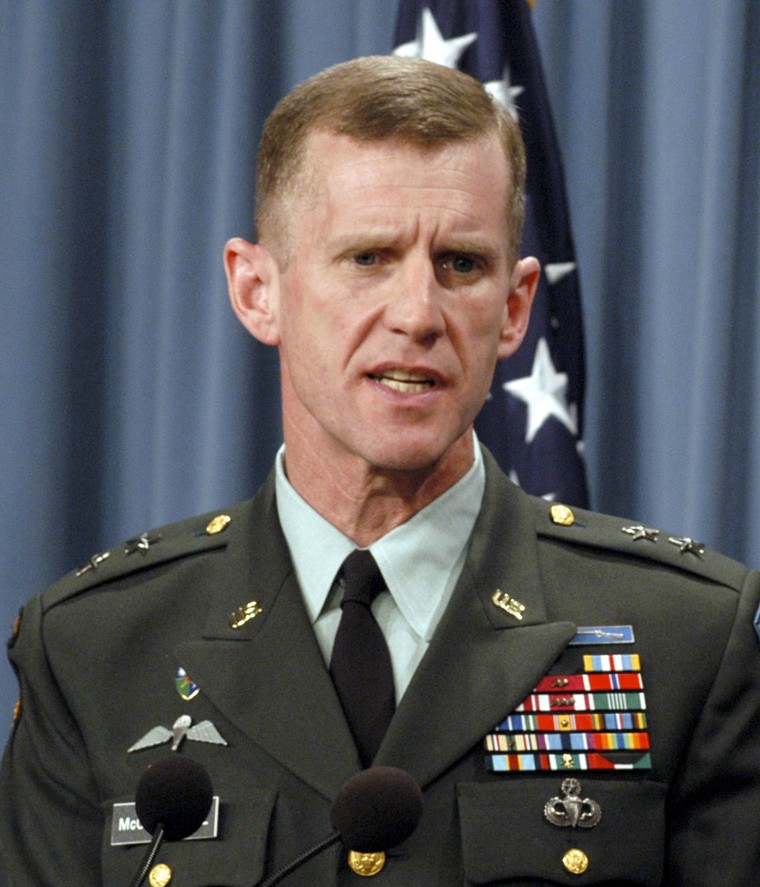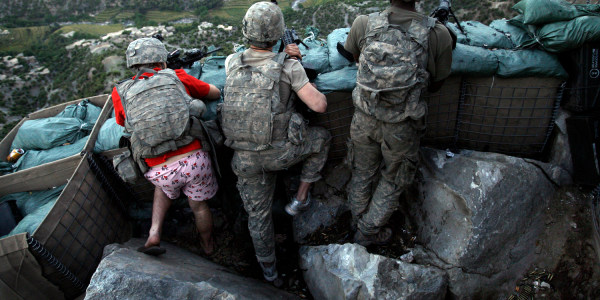Lt. Gen. Stanley A. McChrystal, the former Special Operations chief who is President Obama's new choice to lead the war in Afghanistan, rose to military prominence because of his single-minded success in a narrow but critical mission: manhunting.
As commander of the military's secretive Joint Special Operations Command (JSOC) for nearly five years starting in 2003, McChrystal masterminded a campaign to perfect the art of tracking down enemies, and then capturing or killing them. He built a sophisticated network of soldiers and intelligence operatives who proceeded to decapitate the Sunni insurgent group al-Qaeda in Iraq and kill its most notorious leader, Abu Musab al-Zarqawi. He has also led the hunt for Osama bin Laden and other al-Qaeda leaders in Afghanistan and Pakistan.
To succeed in the more expansive and varied Afghanistan mission, military officials and analysts said, McChrystal will have to transcend the perception that he is, at his core, an Army Ranger, an elite practitioner of rapid-fire raids intended to "find, fix, finish" the enemy.
Instead, he will have to embrace the more unwieldy work of building Afghan security forces from disparate tribes, extending governance and cultivating diplomatic skills -- as well as a thirst for endless cups of tea -- that goes along with leading a counterinsurgency campaign.
"McChrystal kills people. Has he ever worked in the counterinsurgency environment? Not really," said Roger Carstens, a senior nonresident fellow at the Center for a New American Security and a former Special Forces officer.
"People will ask, what message are we sending when our high-value-target hunter is sent to lead in Afghanistan?" said a senior military officer at the Pentagon, who spoke on the condition of anonymity because he was not authorized to speak publicly.
But McChrystal's demonstrated drive and intellect, as well as his abilities in team-building and problem-solving, have won him many admirers. "Without a doubt, Lieutenant General McChrystal is one of the five best generals in the Army today. He is the perfect man for the job and will be Afghanistan's Petraeus, if anyone can be," said an Army general who served in Iraq with him. He too spoke on the condition of anonymity because he was not authorized to speak publicly.
McChrystal's strengths
McChrystal, a 1976 West Point graduate who regularly runs to and from work, is known for tackling assignments with intensity and exhaustive energy, according to military peers who know him well. As a young commander in the 1980s, he "was big into road marching in the Rangers -- he expanded it exponentially," said one officer. McChrystal served as an operations officer for the JSOC in the Persian Gulf War and was chief of staff for an Army task force during operations to overthrow the Taliban government in Afghanistan.
Slideshow 16 photos
Camp Restrepo
McChrystal shuns an armchair style of commanding, and even as a three-star general he often joins his men on operations, officers said. As the JSOC commander overseeing Iraq and Afghanistan, for example, McChrystal spent the vast majority of his time overseas, rather than at his Fort Bragg, N.C., headquarters.
Military experts and officers point out that one of McChrystal's most important contributions in Iraq was to reach well beyond military circles to build personal relationships with a wide range of civilian officials -- bringing together expertise in intelligence, forensics, finances and other fields in an interagency task force that strengthened his campaign against the insurgent group al-Qaeda in Iraq.
In this ad hoc way, McChrystal was able to break through bureaucratic obstacles and eventually create a more enduring organization, filled with experienced officials who repeatedly rotated into Iraq. "McChrystal's strength is in part his Rolodex and how he leverages the interagency," Carstens said.
'The toughest team' to build
The Afghanistan campaign -- with its complex military command structure, patchwork of NATO and non-NATO forces, and large international civilian presence -- presents a similar challenge but on a far larger scale, analysts said. "Afghanistan is the toughest team" to build, said a senior military officer.
One of the first steps McChrystal is likely to take is to winnow down the military staff in Afghanistan, analysts and officers said.
As a manager, McChrystal favors flatter, faster organizations and is known for preferring a small staff that is overworked rather than a large one that has time to grow unfocused, according to officers who have worked under him.
Abuses, Tillman's death
Adm. Mike Mullen, the chairman of the Joint Chiefs of Staff, tapped McChrystal to become director of the Joint Staff last year. McChrystal's confirmation in that post was delayed by the Senate Armed Services Committee, some members of which voiced concern about his oversight of detention facilities where abuses occurred. The committee also looked into McChrystal's role in the Army's handling of the friendly-fire death of Ranger Cpl. Pat Tillman in Afghanistan.
After McChrystal was confirmed, Mullen gave him the assignment of making the Joint Staff a more responsive organization. McChrystal immediately instituted a regimen of 6 a.m. video teleconferences from around the world. Mullen "is a big fan of McChrystal. He's been positively delighted by his performance," said a Joint Staff official.
One critical task for McChrystal, military officers said, will be to more closely integrate the efforts of the growing number of conventional troops and Special Operations forces in Afghanistan, where 47,000 U.S. and 33,000 non-U.S. troops now serve. That will require balancing the mission of killing and capturing Taliban insurgents with the broader work of protecting the population.
Lt. Gen. Dennis Hejlik, commander of the 2nd Marine Expeditionary Force, who served with McChrystal in Iraq, said yesterday that McChrystal "understands the value of high-value targets" as well as "having the small unit on the ground" to provide better security for Afghans. McChrystal "really does understand that you're not going to win the war by killing all the enemy," he said, adding, "He did that in Iraq for five years."
Staff researcher Julie Tate contributed to this report.
More on: Stanley A. McChrystal | Afghanistan

